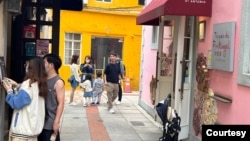Macao, the former Portuguese colony that has become the world’s biggest gambling city in recent years, is embarking on an experiment to remake itself, but it’s unclear if it will succeed.
Visitors to the city see a difference compared to 10 or 20 years ago.
There are new and bigger casino resorts — from The Londoner to MGM Cotai — and they no longer offer just slot machines and gambling tables. They feature non-gaming entertainment — from water slides to concerts. There’s even a zipline.
The city that has relied on gaming revenue for decades has been betting on non-gaming attractions to lure non-gamblers, in hopes of diversifying its economy.
But behind the water splashes and zipline rides, Macao is struggling to live up to its nickname: Las Vegas of the East.
Although its gaming revenue has exceeded that of Las Vegas by three-fold before the COVID-19 pandemic, unlike its U.S. counterpart in Nevada — whose casino earnings are 70% non-gaming and 30% gaming — Macao’s mix is just 5% non-gaming and 95% gaming, according to IGamiX, a Macao-based consultancy.
That’s far from China’s wishes when the city returned to Chinese sovereignty in 1999 and soon after, ended the casino monopoly, opening the sector to foreign competition in hopes of turning Macao into a leisure and entertainment capital.
“I don’t think anyone realized when they let the genie out of the bag, that the market would be predominantly mainland China,” said Ben Lee, a gaming analyst at IGamiX. “In the past 20 years, instead of transforming into a world center for tourism, all Macao has become is a world center for Chinese gambling. It was never meant to be that. The intention was to make Macao into Vegas.”
Beijing has urged Macao to end its dependence on gaming. It has tried to reduce the number of Chinese gamblers flocking to the only place in China that allows gambling, by restricting the number of visits Chinese residents from some provinces can make to Macao to only six per year.
Beijing has also tried to stem the flow of an estimated $150 billion a year in Chinese capital, especially corruption money, to Macao, and banned promoting overseas gambling on the mainland.
Those measures and President Xi Jinping’s crackdown on corruption have significantly reduced Macao’s gross gaming revenue from the record high of $45 billion in 2013 to $22 billion last year.
But Macao is still heavily dependent on gaming, which accounted for more than 50% of its GDP before COVID-19 and 60% of government revenues in 2023, according to official figures.
So last year, Macao’s government began requiring casino operators to diversify their customer base and invest heavily in non-gaming projects, as a condition for renewing their concession licenses. That’s on top of a 40% casino tax.
The six concessionaires — Wynn, Sands, SJM, MGM, Melco, and Galaxy — have pledged to invest a combined $13.6 billion to explore overseas customer markets and develop non-gaming projects, including conventions and exhibitions, entertainment, and performances.
However, a year later, it’s unclear whether this new approach will work.
Observers said many casino operators remain reluctant to shift their focus from gaming, an easier money-maker, to less profitable non-gaming ventures.
“We have been living with casinos for decades. It’s not that easy to say I want to diversify the company. You have to cultivate a mentality for this kind of diversification. It will take time,” said community leader Miguel Senna Fernandes. “I don’t see this yet.”
Analysts pointed to “half-hearted” attempts by some casinos to meet the government’s mandate: simply opening retail shops or holding concerts by oldies singers transplanted from Vegas.
Casino operators have not accepted VOA’s requests for interviews.
In a statement to VOA, the Macao Government Tourism Office said, Macao has seen an increase in the number of non-gaming visitors “and the government’s efforts to diversify the tourism attractions have received positive feedback.”
It said exit surveys found visitors’ top three reasons for being there were shopping, sightseeing and gastronomy.
But the most recent statistics show gaming still accounted for nearly 80% of tourism revenue in 2022.
Experts say it may be difficult to replicate Vegas.
“Since early years, Vegas has had an alternative economy. You have a leisure industry which makes Las Vegas so diversified; it’s not just gambling. My friends go to Las Vegas, they don’t go to gamble. They say it’s totally different from Macao, which is casino, casino, casino,” Fernandes said.
He and others see the government’s requirements on casinos to promote non-gaming as a positive move.
“Now there’s a chance to change the rules of the game,” said Fernandes, head of the Macanese Association, which hopes Macao’s unique mixed-race culture can also be promoted.
Some casinos are starting to catch on to what draws visitors. Galaxy organized a 23,000-ticket concert by the Korean girl group Blackpink last year that sold out within seconds.
“That jolted the entertainment scene. That’s massive,” Lee said. “They could’ve had two weeks of Blackpink instead of two nights.”
But what keeps more overseas tourists from visiting may be few direct flights to Macao, competition from casinos opening elsewhere in Asia, tourism services geared toward Chinese speakers, and a transportation system that struggles to cope with massive numbers of tourists, many of whom must wait in long lines for an insufficient number of taxis or crowded buses, especially during public holidays.
Amid these growing pains are concerns the government’s “meddling” in casino operations, by cracking down on cross-border recruitment of Chinese high rollers and specifying how many gambling tables and slot machines casinos can have, could hurt earnings.
“The Communist Party of China … has never been comfortable with legal gambling. So, they have decided they will use carrots and sticks to reshape the world’s largest casino market,” gaming expert I. Nelson Rose wrote in a blog. “Perhaps the greatest danger to the free market casinos of Macau is the government’s meddling in their day-to-day operation,” he added.
For now, casino operators are complying by trying to attract visitors from other countries, building more recreational facilities, including a new water park and theme park, and organizing more performances.
Each concessionaire has also been assigned an old district to redevelop, from piers and shipyards to a fortress neighborhood and a former firecracker factory.
“It’s kind of like a big experiment that hasn’t happened in this way anywhere else,” said Tim Simpson, author of Betting on Macau: Casino Capitalism and China’s Consumer Revolution.
“There’s an interesting social and economic experiment to see if they can be tasked with revitalizing areas, attracting different tourists to the city, and providing sporting or music events. It would be interesting to see the outcome of this big experiment that is happening here.”
It may mean lower profitability and more work for casinos, but there seems to be no choice and no turning back.
“At the end of the day, it is good for Macao. It’s what we should’ve done in the first 20 years,” Lee said.
If Macao succeeds, it may live up to its moniker — the Las Vegas of Asia.



